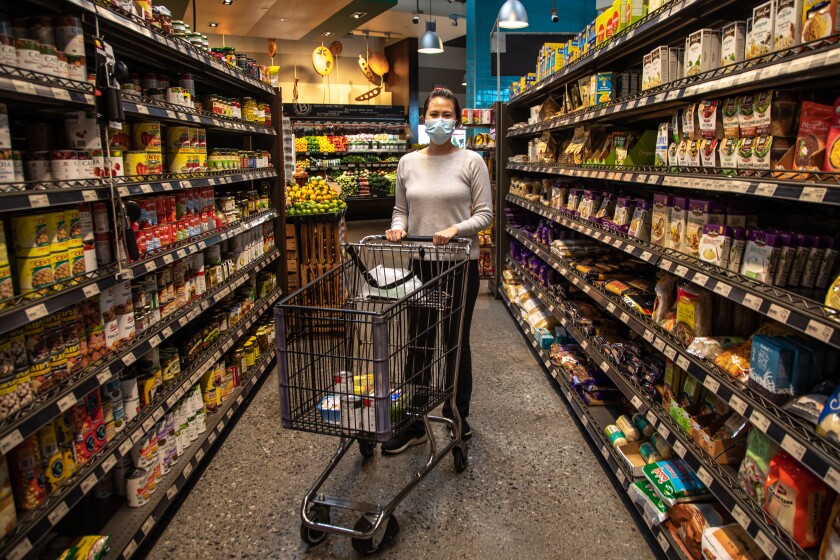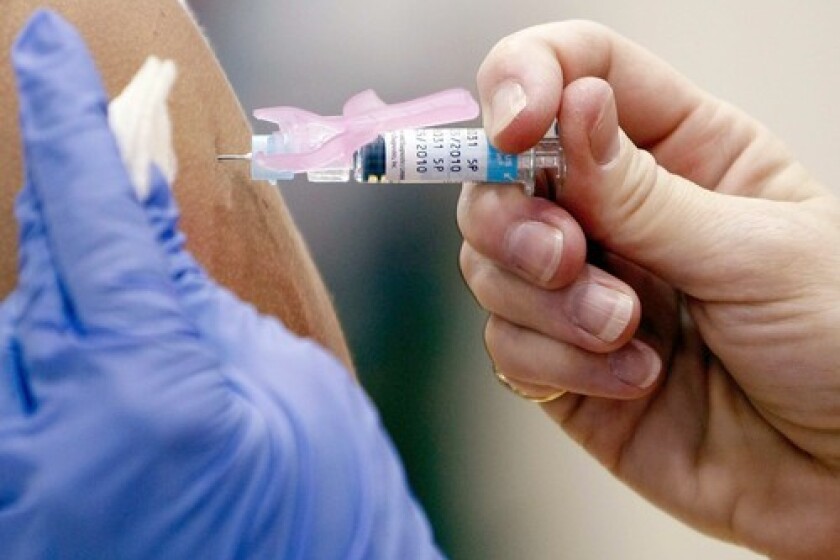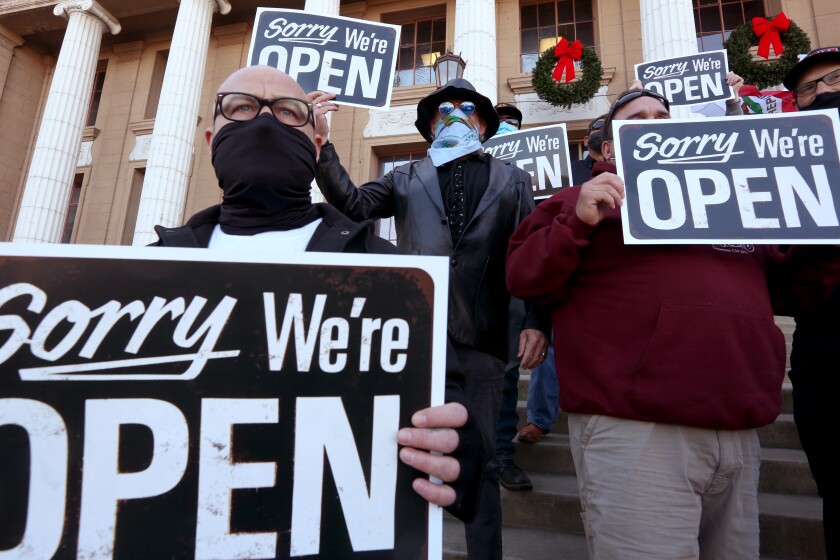
Supermarkets have been hit hard by the unprecedented explosion of the coronavirus in Los Angeles County, further straining an essential service that needs to remain open despite the new stay-at-home order.
Outbreaks are increasing at an alarming rate across industries, officials say — an unavoidable consequence of so many people falling sick in the region. But those at grocery stores and other essential retailers pose a unique challenge for officials attempting to reduce coronavirus transmission, as well as for county residents trying to pare down their activities to only what is necessary.
L.A. County is investigating ongoing coronavirus outbreaks at 490 businesses, compared with 173 a month ago, according to county data. The increase in outbreaks drives home officials’ warnings that the only way to stay safe is to stay home, even as many businesses remain open.
“Many things are permitted still, but they may not be wise, and they carry immense risks for you and the people around you,” Dr. Christina Ghaly, the county health services director, said last week.
Barbara Hughes, a cashier at a Food 4 Less in Palmdale, said she had to put in 70 hours last week because so many of her colleagues are out with COVID-19. Twenty-one employees have recently tested positive for the virus, according to county records.
“Every single one of my managers has COVID — one of them is really sick,” said Hughes, 61. “It’s stressful, but I just tell myself: ‘You gotta go. You gotta work.’”
County officials estimate that 1 in 80 people in the county are infectious with the coronavirus, the highest prevalence yet recorded. With so many people infected, it’s likelier than ever that a co-worker or customer could be ill, and that a single case could multiply into dozens.
“The number of outbreaks is extraordinary — we’ve just never had this many,” said Dr. Jeffrey Gunzenhauser, L.A. County chief medical officer.
Of the six outbreaks at Food 4 Less locations reported to the county during the pandemic, three — including the one at Hughes’ store — were first logged this month, linked to the current surge, according to a Times analysis of outbreaks posted on the county’s website. An outbreak is defined as three or more cases among staff in a 14-day period.
There have also been new outbreaks reported in December at three Trader Joe’s locations, two Whole Foods Market stores, three Sprouts Farmers Market branches and several smaller grocery chains, county and company records show.
Indoor environments where people are often in close, prolonged contact can become hotbeds for the coronavirus, especially when the pathogen is so widespread, experts say. The Times analysis also found a jump in outbreaks this month at banks, postal outlets, pharmacies, hardware stores and many nonessential businesses.
Gunzenhauser recommended consolidating trips to businesses, perhaps visiting the grocery store every other week instead of weekly, if possible. People should also be prepared to leave and return another time if the store is too crowded, lines are long or shoppers aren’t wearing masks.
“You should have a Plan A and a Plan B,” he said. “If things are operating as they should, I’m comfortable with that — people shouldn’t have an irrational fear that just walking in the building is a problem.”
He pointed out that customers are more likely to be in close contact with other shoppers than with employees, so community prevalence may be a better indicator of risk than whether a store recently suffered an outbreak among staff.
County officials have tried to limit the potential for outbreaks at stores and last month dropped the maximum capacity allowed at grocery stores and other essential retailers to 35% and to 20% at all other retailers as part of a stay-at-home order. Officials so far have said they are not planning to further tighten restrictions.
Hughes said it felt as though COVID-19 started coming for the Palmdale store’s employees one by one last month. First it was one store manager, then another and another. The entire meat department is out, as well as a handful of people from the produce and deli sections, Hughes said.
“I worry every day that I’m going to bring this virus home to my grandsons that live with me,” said Hughes, who has worked at Food 4 Less for 26 years. “This is really the worst I’ve ever been through.”
Hughes says some of her regular customers have fallen sick as well; one of them, a mother of young children, died from the virus. Vendors who drop off goods at the store also have come down with COVID-19, she said.
It remains unclear where these shoppers and vendors became infected, as well as with whom the store’s outbreak originated. County health officials say it is extremely difficult to pinpoint the sources of infections when so many infected people are asymptomatic.
On Friday, Hughes and her colleagues demonstrated outside the store to advocate for hazard pay. She received a $2-per-hour bonus in the spring, but it ended after six weeks, she said. She put the funds aside along with her stimulus check and told her kids: “If anything happens to me through COVID, this is the money.”
Food 4 Less spokeswoman Vanessa Rosales said the chain had invested $1.3 billion to reward associates and implement safety measures throughout the pandemic. She said that they were proud of their staff for serving the public “when they need us the most.”
“Our most urgent priority throughout this pandemic has been to provide a safe environment for our associates and customers,” Rosales said in an email. “We would not operate stores that are hazardous.”
The county health department has fined more than 200 businesses since August for violating COVID-19 precautions, none of which have been grocery stores, according to county records.
However, Gunzenhauser, of the health department, said that less serious violations were common. Half of the businesses visited by county investigators last week were found to have some kind of safety lapse, such as people not properly wearing masks or distancing, he said.
Still, he said that business owners were largely becoming more compliant and often found themselves in a tough position, as cases linked to their workplace don’t necessarily originate there. Sometimes cases spread when workers spend time together in close quarters after their shift ends, he said.
“When you get to 15,000 cases that we’re diagnosing [each day] and you just look at where those people are, you’re going to suddenly realize a lot of them work,” he said. “It’s just because there are so many cases — whether they get it at the workplace or they got it at the community.”
Other food retailers that reported outbreaks recently included Gelson’s Markets in Marina del Rey, Super A Foods in Glassell Park and Superior Grocers in City of Industry. Three outbreaks at Vallarta Supermarkets were reported this month. Five of the 10 outbreaks at L.A. County Target locations since the pandemic began were reported in December.


